 Petzlover
Petzlover Both Cao da Serra de Aires and Rafeiro do Alentejo are originated from Portugal. Cao da Serra de Aires may grow 20 cm / 7 inches shorter than Rafeiro do Alentejo. Cao da Serra de Aires may weigh 33 kg / 72 pounds lesser than Rafeiro do Alentejo. Both Cao da Serra de Aires and Rafeiro do Alentejo has almost same life span. Cao da Serra de Aires may have less litter size than Rafeiro do Alentejo. Both Cao da Serra de Aires and Rafeiro do Alentejo requires Moderate Maintenance.
Both Cao da Serra de Aires and Rafeiro do Alentejo are originated from Portugal. Cao da Serra de Aires may grow 20 cm / 7 inches shorter than Rafeiro do Alentejo. Cao da Serra de Aires may weigh 33 kg / 72 pounds lesser than Rafeiro do Alentejo. Both Cao da Serra de Aires and Rafeiro do Alentejo has almost same life span. Cao da Serra de Aires may have less litter size than Rafeiro do Alentejo. Both Cao da Serra de Aires and Rafeiro do Alentejo requires Moderate Maintenance.
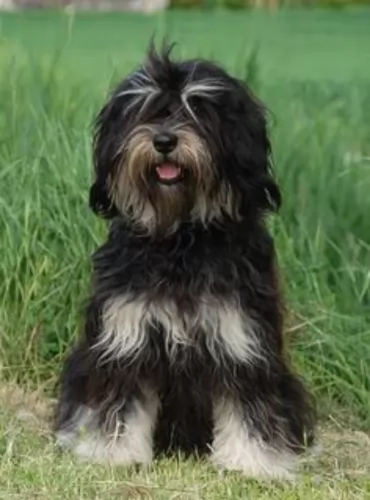 Ancestors of the Cao da Sera de Aires were used for herding livestock in the Serra de Aires and Alentejo, Portugal. This herding dog is native to Portugal and throughout the 20th Century he was kept as a working dog.
Ancestors of the Cao da Sera de Aires were used for herding livestock in the Serra de Aires and Alentejo, Portugal. This herding dog is native to Portugal and throughout the 20th Century he was kept as a working dog.
Known also as the Portuguese Sheepdog, Portuguese Shepherd Dog or Serra de Aires Mountain Dog, there are some questions surrounding the breed's ancestry as there are few records of dogs before 1900. The dog is thought to be related to the Pyrenean and Catalan Sheepdogs and that it has descended from Briards which were imported into Portugal and crossed with the Pyrenean Sheepdog.
The Cão da Serra de Aires breed standard was accepted by the Portuguese Kennel Club, and the breed was recognized internationally in 1996. The dog was also recognized by the United Kennel Club in the Herding Group in 2006.
 Known also as the Portuguese Mastiff, the Rafeiro do Alentejo comes from Portugal and has always been used as guardian for livestock. Their numbers declined quite a bit when there was no longer a need for this kind of job.Today it is essentially a companion dog.
Known also as the Portuguese Mastiff, the Rafeiro do Alentejo comes from Portugal and has always been used as guardian for livestock. Their numbers declined quite a bit when there was no longer a need for this kind of job.Today it is essentially a companion dog.
The official standard of the Rafeiro do Alentejo was established in 1953. The dog is is recognized as a breed by the Portuguese Caniculture Club as well as the Federation Cynologique Interationale.
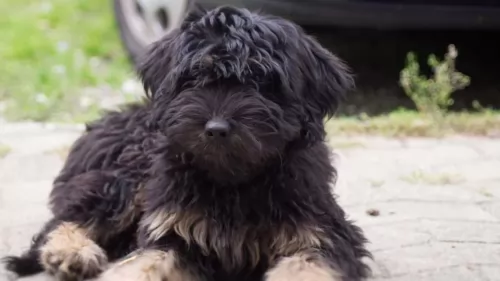 The beautiful Cão da Serra de Aires is a medium-sized dog. He stands at 45 to 55 cm at the withers and weighs about 17 to 27 kg. He is recognizable by the long, shaggy, single-layer coat, of straight or slightly wavy hair. Don’t be deceived by the coat as below, the dog has a muscular, athletic body.
The beautiful Cão da Serra de Aires is a medium-sized dog. He stands at 45 to 55 cm at the withers and weighs about 17 to 27 kg. He is recognizable by the long, shaggy, single-layer coat, of straight or slightly wavy hair. Don’t be deceived by the coat as below, the dog has a muscular, athletic body.
The coat comes in different shades such as fawn, gray, yellow and black. The dog has a long tail which is held straight out or down and he has medium-length, floppy ears. You’ve got to look hard, as the facial features of the dog are hidden by its shaggy coat. He has a lot of facial hair that sometimes you have to wonder if he can see out of his eyes.
The Cao da Serra de Aires is a wonderful canine companion and is devoted and loyal, forming strong bonds with their human family. He is a playful, amicable dog and gets on well with children in the home as well as with other pets.
He is intelligent and trainable, and when properly trained and socialized,he becomes an even nicer pet to have around and is obedient to his master’s voice. He is territorial, strong willed and dominant and makes a good watchdog too.
 The Alentejo is a large dog standing at between 64 and 75cm in height and weighing 45 to 60kg. He is a powerful dog with a deep chest, dark eyes, floppy ears. His coat is short to medium length, thick and straight. The color of the coat is a mix of fawn, a wolf grey, white, cream and black.
The Alentejo is a large dog standing at between 64 and 75cm in height and weighing 45 to 60kg. He is a powerful dog with a deep chest, dark eyes, floppy ears. His coat is short to medium length, thick and straight. The color of the coat is a mix of fawn, a wolf grey, white, cream and black.
This is a serious dog with a calm demeanour about him. It doesn’t matter how calm he is though, as every dog will require training ad socialization if you want to enjoy having an obedient, well mannered dog around you. This is particularly important with a large, independent, self-confident, territorial dog like this.
He isn’t an aggressive dog but he is protective, wanting to guard and look out for his human family. They are dogs that get on well with children and other pets in the home, being wary of strangers.
They’re not recommended for life in small properties in the city as he requires a large garden at least.
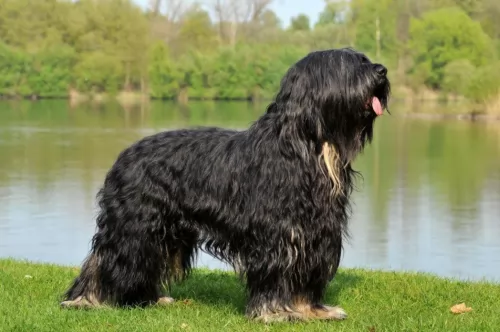 The Cão da Serra de Aires is such a loyal dog to his human family that he makes a splendid pet. He is active, having worked historically at herding and guarding.
The Cão da Serra de Aires is such a loyal dog to his human family that he makes a splendid pet. He is active, having worked historically at herding and guarding.
Socialization and obedience training ensure that he becomes an exceptional pet and he has a host of positive attributes to his name – he is intelligent, energetic, loyal and loving. He may have been used long ago to guard livestock, but today he is selected as a pet specifically for his excellent companionship and for his protective nature.
 The Rafeiro do Alentejo is a quiet dog, but intelligent and strong-willed. Training and socialization will make him easy to get on with.
The Rafeiro do Alentejo is a quiet dog, but intelligent and strong-willed. Training and socialization will make him easy to get on with.
He will become an excellent companion, and can come indoors because he is well mannered and considerate. He was bred to be a guard dog, and the responsibilities he had taking care of livestock has been transferred to looking out for- and protecting his human family.
He makes a wonderful pet and companion, even with children and other pets, more so when brought up correctly by loving, firm, consistent dog owners.
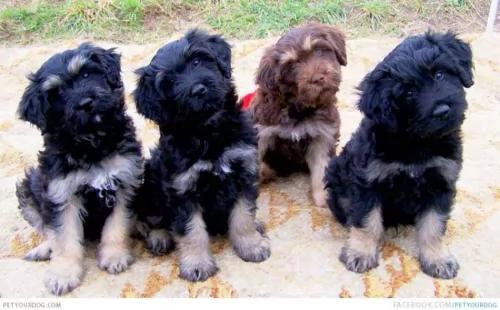 As with most dogs that are looked after well, their health can be good. The Cao da Serra de Aires isn’t likely to keep you at the vet often. Just like with any good dog, there are some health disorders that can benefit you to know about.
As with most dogs that are looked after well, their health can be good. The Cao da Serra de Aires isn’t likely to keep you at the vet often. Just like with any good dog, there are some health disorders that can benefit you to know about.
Being forewarned , you can get your pet to the vet quickly before the illness gets out of hand.
There are some pet owners who want to have their pets tested by the Orthopedic Foundation for Animals as well as the Canine Eye Registration Foundation to rule out health defects such as hip dysplasia and cataracts before they manifest themselves in their pets. This is of particular importance to breeders so as to prevent the parent dogs passing bad genetic conditions to the puppies.
This is a common skeletal disease where the dog’s hip joints don’t develop properly. It can be terribly painful for your pet to get around. It’s a genetic condition and while it is more prevalent in big dogs, any breeds are susceptible.
Your dog will battle along with painful joints and sometimes his hind-end will be lame. You’ll notice that once lying down, he battles to get up again. Fortunately vets are well acquainted with this ailment and they have different options to treat and manage it.
Cataracts in your dog come about from a disease process which affects the lens of the eye. The eye loses its transparency and impairs vision. There are some instances where cataracts can cause blindness. You’ll see a whitish gray area in your pets eye. The most common cause of cataracts is genetics. Get your pet to the vet who will do certain tests to evaluate the eyes and make a recommendation.
 The Rafeiro do Alentejo is a generally healthy dog breed, and with good care can get to 11, 12 or 13 years of age.
The Rafeiro do Alentejo is a generally healthy dog breed, and with good care can get to 11, 12 or 13 years of age.
Of course with a large dog like this, it is always a good idea to be aware of canine hip dysplasia, particularly because this is a large dog with a deep chest.
This makes him also vulnerable to bloat, a condition where the stomach swells with gas and which can be life threatening. Other things to watch for are ear infections and parasites.
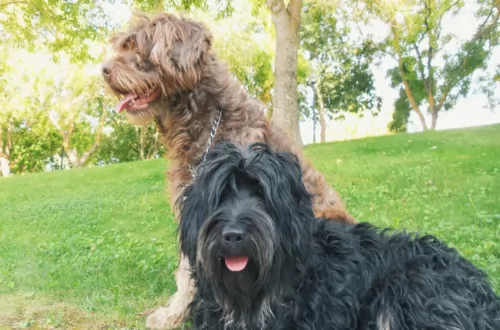 As a working dog used to long hours of action, the Cao da Serra de Aires will need lots of activity. He’ll need you taking him for long walks and playing ball games with him. He can become frustrated and destructive when left without any physical stimulation.
As a working dog used to long hours of action, the Cao da Serra de Aires will need lots of activity. He’ll need you taking him for long walks and playing ball games with him. He can become frustrated and destructive when left without any physical stimulation.
The Cao da Serra de Aires may have long hair but he isn’t high maintenance. He won’t require professional grooming, but will require a good brush a least twice a week. This is because the long coat can tangle.
To keep him looking his best, you’ll want to be trimming the hair around his paws. Another important grooming task is checking his ears and cleaning them. You have to be careful about cleaning your pet ears if you don’t know how, as it could damage the ears. Your vet can always advise you on how this is done.
 Make your grooming time with this serious, calm canine friend of yours a special bonding time. His coat simply requires a brush twice a week to keep it healthy and shiny.
Make your grooming time with this serious, calm canine friend of yours a special bonding time. His coat simply requires a brush twice a week to keep it healthy and shiny.
While bushing him, run your hands over him to make sure there aren’t any unusual lumps. Check inside the floppy ears to make sure they’re not red which could be the start of a painful ear infection.
Look a his nails and trim them if they’ve become too long. Check inside his mouth and make sure there aren’t any black, rotten teeth as this can seriously impact the health of your pet.
Options for exercise will include long walks and a chance to run off his leash. In the back yard it will be to his benefit to throw balls for him to fetch. You can even bring him indoors and play some calm games with him. He should have exercise every single day.
Good food is needed for good health. It is always convenient to make use of the commercially manufactured dog foods there are on the market.
You don’t want to feed this to your dog day after day so provide your pet with some tasty home-made food too. Dogs want simplicity and consistency with their diets so they don’t battle with upset stomachs and an unnecessary trip to the vet.
Some home-cooked food twice a week and added to the dry kibble can keep him healthy and happy. Boiled chicken, sweet potatoes, brown rice or pasta, carrots and spinach will be perfect for him. Chop the food up finely and add it into the dry kibble once or twice a week.
Some people even cook it in bulk, refrigerate it and warm up small portions to add to the kibble. Raw meat added in occasionally can also be a good treat. Make sure your pet is never without a constant supply of fresh, cool water.